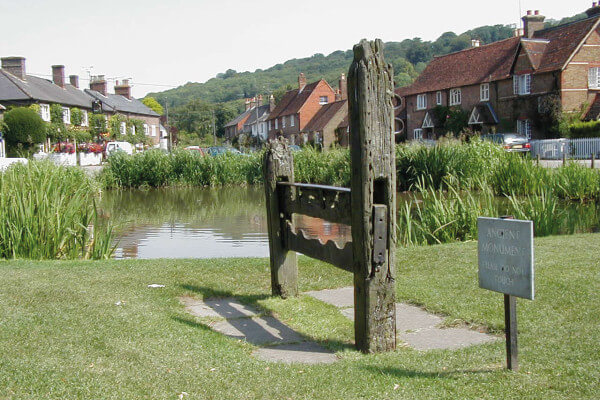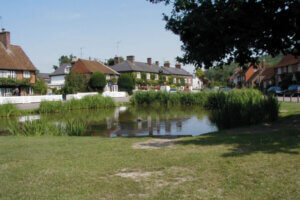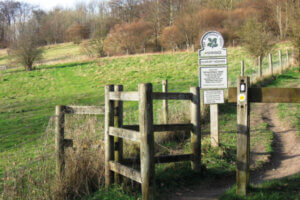The Aldbury Poachers

The chocolate box village of Aldbury has a dark Victorian tale in its history, beyond its thatched cottage and picture postcard village pond.
Today, Aldbury is the destination for tourists from near and far, who come armed with cameras to capture this pretty English village, complete with thatched cottages and ancient buildings. It’s favoured by walkers and cyclists who enjoy its location near the Ashridge Estate.
And despite the presence of the village stocks by the pond, which have stood there for several hundred years, it’s hard to imagine that at one time, the village and criminal activities of some of its residents, came under the hard glare of national publicity.
Most crime in Aldbury in the 20th and 21st century has been of the fictional variety – with the likes of TV series Morse and Midsummer Murders filmed there, but in 1891, it was poaching that was attracting attention…
By the late 19th century, Victorian policing had helped to bring about a more lawful society on the whole, but when it came to game laws, poachers and gamekeepers often went into battle, and so it was in the case of the Aldbury poachers.
Three poachers were taken to court over the deaths of two gamekeepers. The trial brought much attention, with angry exchanges in Parliament, petitions to the Home Office and much national debate.
Both gamekeepers were employed by Joseph Grout Williams, owner of Pendley Manor at the time and a prominent Conservative and Justice of the Peace. The area was renowned for fashionable weekend shooting parties, thanks to its location not far from London.
 The issue at the heart of the case seemed to be less about murder but rather centred on it not being possible to steal game birds and animals because they were, in fact, wild by nature. And there were also assertions that poaching was a ‘lost’ English liberty, thanks to the hunting monopoly introduced after the Norman Conquest.
The issue at the heart of the case seemed to be less about murder but rather centred on it not being possible to steal game birds and animals because they were, in fact, wild by nature. And there were also assertions that poaching was a ‘lost’ English liberty, thanks to the hunting monopoly introduced after the Norman Conquest.
Indeed, according to Stephen Ridgwell, writing for History Today: ‘In the month preceding events at Aldbury, Kier Hardie’s Labour Leader expressed admiration for the ‘honest and independent poacher’ and cast the ‘landlord and his bullying crew of gamekeepers’ as the real criminals.’
The event happened on the evening of 12 December 1891 in Aldbury Nowers woods. The three poachers – two labourers and a chair-turner – set off for the wood on the hunt for pheasants. The men were all in their 30s, married with families, and were experienced poachers.
During the winter, work was no doubt scarce and while their defence might have said that their motivation was economic they did commit an office by going out armed.
When the gamekeepers confronted them, however, the poachers decided to fight back rather than run away or be detained (facing up to 14 years in prison for a poaching offence). At the end of the trial in February 1892, the poacher who had fled the scene at the time, was sentenced to 20 years in prison for manslaughter while the other two were given the death sentence.
Following sentencing, a jury member announced their doubts about the verdict and there followed calls for a reprieve and the national debate on game laws was rekindled, with the likes of Robert Buchanan, a humanitarian and writer, and the naturalist Alfred Wallace weighing in on the debate.
Despite the outcry, the sentences remained and the two men found guilty of murder were hanged at Oxford Gaol in March 1892.

Aldbury Nowers woods is now reputed to be haunted…
The incident even made it into the novel, Marcella, by social commentator and author Mary Augusta Ward, who included some details of the case in her book, published in 1894.
Mary had been living in Stocks, the Georgian manor in Aldbury, since the summer of 1892, close to the place where the gamekeepers were killed.

